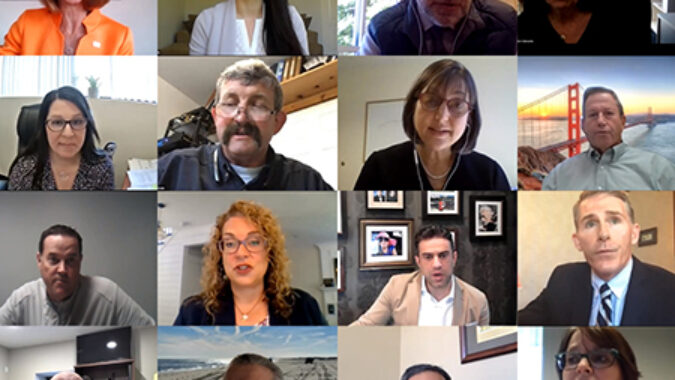New Jersey industry leaders, small business owners, and a number of state and local legislators joined the New Jersey Business Coalition’s New Jersey Hiring Crisis virtual town hall today to address severe labor shortages as the state emerges from yearlong COVID-19-related restrictions.
The 90-minute event, which featured more than 150 attendees, was moderated by New Jersey Business & Industry Association President and CEO Michele Siekerka who commented, “As we head into the peak economic season for New Jersey and the welcomed reopening of our New Jersey businesses, it is incumbent upon us to make sure we have a workforce at the ready to fill the hundreds of thousands of jobs that have become available or forfeit the ability for our economy to have a robust comeback.”
In addition to representatives of the restaurant and hospitality sector, which has been at the forefront of this issue, the town hall also featured speakers from the childcare, trucking, healthcare, agricultural, lodging, manufacturing, tourism, landscaping and dental professions – with virtually all participants pointing to the extension of unemployment benefits through the end of summer as a major roadblock to getting New Jerseyans back to work and the economy thriving again.
“The extended unemployment benefits are just not necessary anymore; for New Jersey to have 7.7% unemployment right now with the demand we’re experiencing is completely illogical and has to change,” said Arnold Kamler, chairman and CEO of Kent International Inc., a bicycle manufacturer with 60 employees in New Jersey. “People are being paid more to stay home than to work. This is not American, it’s not capitalistic.”
Many were reacting to Gov. Phil Murphy’s statement last week that he has no plans to discontinue extended unemployment benefits, as some other states have done, calling the worker shortages “temporary” and “a passing reality.”
Yet others believe the shortages may have long-term effects on New Jersey’s economy – especially heading into the summer peak season – if the tourism and hospitality sector can’t meet the pent-up demand of consumers who withheld spending during the pandemic.
“The hospitality industry is the second largest industry in New Jersey, and we have been hit the hardest,” said Bhavesh Patel, New Jersey Restaurant and Hospitality Association chairman and president of ADM Hotels. “We are getting bookings, but we can’t find staff to clean the rooms despite paying $18 to $20 (an hour) for housekeepers, and close to $25 (an hour) for people to work the front desk, so the rooms are sitting empty. We’re upon the summer season. We need help, and we need help right away.”
Patel and others suggested giving people an incentive to come back to work, whether it’s a tax credit or a bonus for coming off unemployment, while also encouraging grants that will make it easier for small businesses to attract and maintain workers.
Also mentioned was the easing of COVID-19 restrictions on childcare facilities, which prevent them from operating at 100% capacity and have caused more than 1,300 childcare centers to close over the past year, severely impacting parents who rely on childcare to go to work.
“Our centers need to fully reopen to increase capacity and allow working mothers to return to the workforce,” said Karyn Jarzyk, owner/operator of numerous Kiddie Academny locations in the state. “Lifting capacity and other restrictions will allow the childcare industry to open classrooms to many more mothers trying to return to work.”
This lack of childcare is causing challenges in the behavioral healthcare field, said Vera Sansone, president and CEO of CPC Behavioral Healthcare, as many teachers and other workers have young children still not back in school full-time.
“Staffing is always a challenge, but COVID made it worse. It has increased the need for mental health and substance abuse services, possibly by 30% to 35% in the next year,” she said.
Also adversely affected by the worker shortage is New Jersey agriculture, the third-largest industry in the state. “The season is just getting underway, and we’re hearing reports of producers not being able to attract and maintain employees,” said Kurt Alstede, who has been operating a farm in Chester for 40 years. “It appears unemployment insurance benefits have taken away the incentive to work. Everyone is paying higher wages and we’re very concerned with rising food prices. It’s time for people to return to work and time for us to stop rewarding people for not working.”
The trucking industry has also been hard-hit, according to Bill Messenger, president of Campbell’s Express in Pitman and president of the New Jersey Motor Truck Association. He says the pandemic led to many early retirements and a shortage of Class B and Class A drivers, which is affecting the entire supply chain.
“We’re going to be giving our drivers another raise, which is going to be followed up by large rate increases to our customers, which is going to be passed to consumers,” Messenger said.
Siekerka, closed the meeting with a plea to the governor: “We need your support now through communications and actions to empower our workforce to come back to work. There are too many examples of people taking advantage of the system, and we need accountability. We need a system that is balanced that helps the employer while protecting the employees who need the benefits.”

